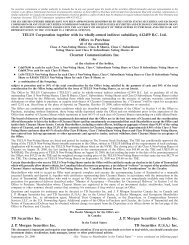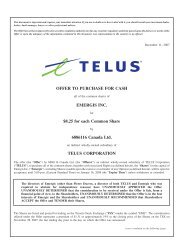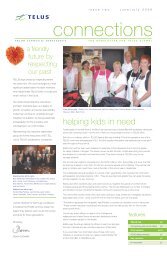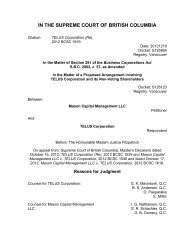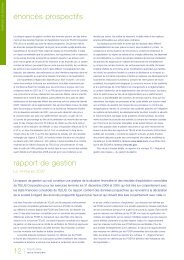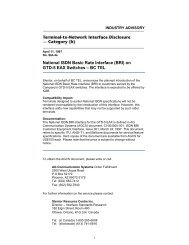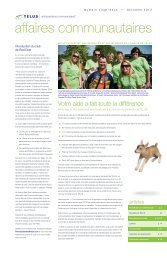Shareholder Letter, September 29, 2012.pdf - About TELUS
Shareholder Letter, September 29, 2012.pdf - About TELUS
Shareholder Letter, September 29, 2012.pdf - About TELUS
You also want an ePaper? Increase the reach of your titles
YUMPU automatically turns print PDFs into web optimized ePapers that Google loves.
<strong>September</strong> <strong>29</strong>, 2012<br />
Dear Fellow <strong>TELUS</strong> <strong>Shareholder</strong>,<br />
Brian Canfield<br />
Darren Entwistle<br />
555 Robson Street<br />
Vancouver, B.C<br />
V6B 3K9<br />
telus.com<br />
We are writing to ask you to please vote FOR <strong>TELUS</strong>’ share exchange proposal. We put this proposal forward to address<br />
concerns our shareholders have expressed about the adverse impact of our dual class share structure on liquidity and<br />
trading volumes. We believe our proposal addresses these concerns and is beneficial and fair to holders of both common<br />
and non-voting shares.<br />
<strong>TELUS</strong>’ proposal provides significant benefits for all shareholders<br />
If approved, our proposal would provide these benefits:<br />
• Increased liquidity and marketability of <strong>TELUS</strong>’ common shares for the benefit of all shareholders –Today,<br />
<strong>TELUS</strong> has approximately 175 million common shares and 151 million non-voting shares. Approving the proposal<br />
would result in one much larger common share class of approximately 326 million shares being available for<br />
trading, which makes our shares potentially more attractive to larger institutional investors. In addition, there would<br />
be an 85 per cent increase in the amount of <strong>TELUS</strong> common shares available to be purchased by non-Canadian<br />
investors and the common shares would be more marketable as they would be listed on the New York Stock<br />
Exchange for the first time.<br />
• Increased value to both classes of shares – The value of our common and non-voting shares immediately<br />
jumped in value on the initial announcement of our share conversion proposal last February and since then have<br />
appreciated to levels beyond that of the overall market index and <strong>TELUS</strong>’ peers. The shares are up 11 per cent and<br />
14 per cent respectively for the period February 21, 2012 (the date we first announced our intent to combine our<br />
share classes) through to the end of <strong>September</strong>, despite the Toronto Stock Exchange index being down by more<br />
than two per cent during this same period.<br />
• A capital structure aligned with best practice – Moving to a single class of issued and outstanding common<br />
shares would align <strong>TELUS</strong>’ capital structure with what is generally viewed as best practice where all shares have<br />
one vote each.<br />
• Fairness – Granting the right to vote to the holders of non-voting shares would enhance <strong>TELUS</strong>’ leadership in<br />
respect of good corporate governance practices. Holders of our non-voting shares already have the same<br />
economic interest (such as the same dividend rights) as the holders of our common shares.<br />
• A “one share – one vote” principle is strongly endorsed by the Canadian Coalition for Good Governance.<br />
• Scotia Capital’s fairness opinion concluded that the one-for-one-exchange ratio is fair, from a financial point<br />
of view, to common and non-voting shareholders, respectively.<br />
Independent leading proxy advisory firm, ISS, recommends both classes of shareholders vote FOR this proposal<br />
Institutional <strong>Shareholder</strong> Services Inc. (ISS), a leading independent global proxy advisory services firm, has stated, “As<br />
the proposed transaction continues to align voting rights with economic interest, offers shareholders meaningful economic<br />
opportunity through increased trading liquidity and a dual listing on the NYSE, and has been ratified by a strong market<br />
response – and as the company’s Articles effectively preclude any exchange ratio other than the proposed one-for-one<br />
exchange – a vote FOR the proposal is warranted.”<br />
Living up to the promise we made to you<br />
In May, we withdrew a similar proposal (which also provided for a one-for-one ratio), after Mason Capital, a New Yorkbased<br />
hedge fund, put in place a trading strategy that was contrary to the interests of <strong>TELUS</strong> shareholders.<br />
Mason’s net economic interest in our company is only 70,900 shares, representing just 0.02 per cent of our total<br />
shares outstanding, yet it controls approximately 19 per cent of the votes associated with our common shares.
– 2 –<br />
Our previous proposal had the overwhelming support of our shareholders – excluding Mason, 92.4 per cent of total shares<br />
received were in favour of the proposal. It also received the endorsement of the two leading independent proxy advisory<br />
firms that institutional investors rely on for advice: ISS and Glass Lewis. However, it was clear that given Mason’s actions<br />
and its large voting position (despite having a minor economic investment in <strong>TELUS</strong>), our proposal would not have passed<br />
if it had gone to a vote in May. This is because only 67 per cent of common shareholders cast votes, which makes it so<br />
important that as many as possible vote FOR our proposal to overcome Mason’s large position.<br />
When we withdrew our previous proposal, we committed to reintroducing a similar proposal in due course on the same<br />
one-for-one ratio so as to preserve its value-enhancing shareholder benefits. This was our promise to you – a promise we<br />
fulfilled when we introduced our share exchange proposal on August 21.<br />
Mason is once again actively seeking to defeat our proposal because, if the proposal is defeated, and the trading price of<br />
the non-voting shares decreases more than the trading price of the common shares, Mason would then profit from the<br />
increased difference between the two share prices.<br />
In other words, Mason does not realize a profit by promoting long-term share value appreciation. This is in stark<br />
contrast to shareholders like you whose interest is in seeing <strong>TELUS</strong> shares appreciate in value.<br />
Independent third-party corporate governance advisor ISS said, “If announcement of the transaction itself increased the<br />
company’s market value higher, voting down the transaction should logically result in the loss of some or all of that<br />
incremental market value.”<br />
Supreme Court of B.C. and highly respected U.S. law firm strongly criticize Mason’s empty voting tactics<br />
As the Supreme Court of British Columbia recently observed in connection with Mason’s efforts to disrupt our share<br />
exchange proposal, “only Mason stands to profit” if the price spread between common shares and non-voting shares<br />
increases and “only Mason is indifferent to the overall value of <strong>TELUS</strong> itself.” Indeed, the highly respected New Yorkbased<br />
law firm Wachtell, Lipton, Rosen & Katz – ranked the Most Prestigious Law Firm to Work For in the USA by the<br />
Avery Index – stated its support for the court’s decision, saying Mason’s empty voting tactics are “deeply pernicious”<br />
and asking the U.S. Securities and Exchange Commission “to undertake comprehensive regulatory reform to address the<br />
ongoing abuse” of investment arrangements by parties like Mason.<br />
Our proposal, which was thoroughly and objectively analyzed, is fair to holders of each class of shares<br />
In an effort to ensure our proposal would be in <strong>TELUS</strong>’ best interests and would be fair to the holders of common shares<br />
and non-voting shares, respectively, <strong>TELUS</strong>’ Board of Directors put in place a process that was consistent with the best<br />
standards of corporate governance. The Board’s process included, among others, the following steps:<br />
• Formation of a Special Committee of the Board composed of independent directors to consider the proposal.<br />
• Direction to this Committee to follow a thorough process consistent with the highest governance standards.<br />
• Obtaining extensive expert financial and legal advice to assist in the decision-making process.<br />
• Obtaining a fairness opinion from independent financial advisors, Scotia Capital, that stated, in their view, the oneto-one<br />
exchange ratio is fair from a financial point of view to holders of shares of each class, respectively.<br />
• Structuring the transaction such that the proposal requires the approval of all shareholders – a simple majority of<br />
the common shares and at least two-thirds of the non-voting shares voted at the meetings – and court approval.<br />
• It is important to note that since our share exchange proposal only affects the legal rights of non-voting<br />
shareholders (and does not affect the legal rights of common shareholders) and does not involve amendments to<br />
our Articles, approval of the common shareholders is not legally required. However, given <strong>TELUS</strong> desires to act<br />
consistent with good governance practices, we decided to provide for common shareholder approval at 50 per cent<br />
plus one vote and, in this fashion, ensure that both classes of shareholders are consulted. ISS supports this<br />
approach, saying, “an affirmative vote from a majority of shareholders is usually considered sufficient evidence of a<br />
clear shareholder mandate.”<br />
Your vote is extremely important. Please vote your yellow proxy or voting instruction form today.<br />
If you have any questions or need any assistance, please call Laurel Hill Advisory Group toll-free in North America at<br />
1-877-304-0211 or by email at assistance@laurelhill.com.
– 3 –<br />
The Special Committee carefully considered a range of different possible exchange ratios and concluded a one-for-one<br />
ratio was the most appropriate for a number of reasons, including:<br />
• The common shares and non-voting shares have the same economic rights, such as the right to any dividends, or<br />
distributions or a share of proceeds on any winding up of <strong>TELUS</strong>.<br />
• Our corporate Articles provide for a one-for-one conversion ratio in two circumstances: the elimination of foreign<br />
ownership restrictions and in a takeover bid. In a takeover bid, a “coat-tail” provision for non-voting shares ensures<br />
that any premium to be paid to voting shares also goes to the non-voting shares.<br />
• We had proposed a one-for-one exchange ratio in 2006 in connection with our planned conversion into an income<br />
trust, as recommended by the financial advisor we had retained. As you may recall, this proposal did not proceed<br />
(despite widespread shareholder support) after the federal government announced a change in tax policy.<br />
Given the Articles and our history, it should be expected that an exchange would eventually occur on a one-for-one basis.<br />
Indeed, the fact our Articles provide for a one-to-one conversion right of non-voting shares into common shares in the<br />
event of the elimination of foreign ownership restrictions was central to ISS’ determination that “support for this proposal is<br />
warranted for both classes” of <strong>TELUS</strong> shareholders.<br />
<strong>TELUS</strong>’ Board of Directors has worked to support the best interests of all shareholders<br />
Scotia Capital, the Special Committee and the Board were well aware that a central issue was the fairness of the<br />
transaction to holders of common shares and carefully considered this matter. It is disingenuous of Mason to suggest that<br />
Scotia Capital was incapable of being objective about what is fair to holders of both classes of shares as Canadian dualclass<br />
share collapse transactions have never involved a separate fairness opinion from a different bank for each<br />
class of shares.<br />
Similarly, it is disingenuous of Mason to suggest that our Special Committee should have been comprised of members of<br />
our Board who were not in some way exposed to the performance of <strong>TELUS</strong>’ non-voting shares. Most directors of<br />
leading Canadian companies – including <strong>TELUS</strong> – are expected to have direct or indirect exposure to the<br />
performance of the shares of their company in order to align their interests with those of the company and its<br />
shareholders. It would therefore have been impossible to set up a Special Committee with directors who were not in<br />
some way exposed to the performance of our non-voting shares as every member is either directly or indirectly exposed.<br />
The fact a <strong>TELUS</strong> Director has direct or indirect exposure to the performance of <strong>TELUS</strong>’ non-voting shares should only be<br />
of concern if that interest is sufficiently material that the Director would be susceptible to having that interest influence<br />
their decision in a manner that might prevent them from putting <strong>TELUS</strong>’ interests ahead of their own. The level of<br />
economic exposure to the non-voting shares that members of <strong>TELUS</strong>’ Board and the Special Committee have is fully<br />
disclosed in our public disclosure and does not constitute a material interest.<br />
In the case of Darren Entwistle, <strong>TELUS</strong>’ President and CEO (who was not on the Special Committee and who has the<br />
largest investment in <strong>TELUS</strong> of all Board members), common shares make up 59 per cent of his total <strong>TELUS</strong> share<br />
ownership and he has received the entirety of his after-tax salary in the form of common shares since the beginning of<br />
2010.<br />
In fact, when it comes to claims about conflicts of interest, it bears repeating that Mason has little substantial net economic<br />
interest in <strong>TELUS</strong>’ shares and stands to profit handsomely through its shorting and hedge trading strategy if it defeats the<br />
proposal, devalues our shares and widens the spread between the two share classes. Mason’s claims about a conflict<br />
of interest are without merit and designed solely to advance its objective of profiting through the destruction of<br />
shareholder value.<br />
Mason relies on an analysis that does not provide a formal opinion of fairness<br />
Mason relies heavily on selective data that Blackstone has assembled in order to try and support its position. However, as<br />
Blackstone states in their disclaimer notice, neither their analysis or results of their services “shall constitute an opinion,<br />
Your vote is extremely important. Please vote your yellow proxy or voting instruction form today.<br />
If you have any questions or need any assistance, please call Laurel Hill Advisory Group toll-free in North America at<br />
1-877-304-0211 or by email at assistance@laurelhill.com.
– 4 –<br />
valuation, or recommendation with respect to any proposed or potential conversion transaction or conversion ratio, and<br />
neither may be relied upon as an opinion, valuation, or recommendation by Mason or any third party.” In comparison,<br />
Scotia Capital has provided a formal “opinion” as to the fairness of the exchange ratio. Notably, Blackstone may receive<br />
an additional fee from Mason contingent on the outcome of the <strong>TELUS</strong> share exchange: in other words, it stands to make<br />
even more money from its analysis if <strong>TELUS</strong>’ proposal is defeated. By comparison, <strong>TELUS</strong> paid Scotia Capital a fixed fee<br />
for its advice and opinion and none of that fee was dependent on whether the proposal was adopted or not.<br />
The Blackstone analysis fundamentally relies on the idea that there is a loss of value to common shareholders, despite<br />
the initial and sustained positive market reaction by both share classes, above those experienced by <strong>TELUS</strong>' industry<br />
peers, as a result of <strong>TELUS</strong>’ initial proposal announcement. The Blackstone analysis also does not consider the fact that<br />
<strong>TELUS</strong> is widely held and does not have a controlling shareholder and that therefore this is not a situation where it is<br />
desirable or necessary to pay a premium in order to return control of the company to its shareholders. In selecting its list<br />
of precedents to consider, Blackstone omits a number of the more relevant Canadian precedents, in favour of U.S.<br />
precedents. As noted by Scotia Capital, most Canadian dual-class share collapse precedents have been done at a onefor-one<br />
ratio, and since 2000 in all 13 instances where such companies had coat-tail provisions (like <strong>TELUS</strong> does) a onefor-one<br />
ratio was used. Even disregarding the more relevant Canadian precedents, 18 of the 25 transactions on<br />
Blackstone’s own list were done at a one-for-one basis.<br />
We need to hear your voice – please vote now FOR our proposal<br />
Moving to a single class of issued and outstanding shares is in the long-term best interests of holders of common shares<br />
and holders of non-voting shares. We urge you not to let the short-term trading strategies of an opportunistic hedge fund<br />
such as Mason frustrate a proposal that is in the best interests of <strong>TELUS</strong> and shareholders who have a real economic<br />
interest in <strong>TELUS</strong>. The exchange proposal is responsive to feedback from those shareholders and is aimed at aligning<br />
<strong>TELUS</strong>’ capital structure with what is generally viewed as best practice.<br />
As the proposal requires the support of a simple majority of the votes cast by the holders of common shares at the<br />
general meeting of <strong>TELUS</strong> and two-thirds of the votes cast by the holders of non-voting shares at the class meeting of<br />
holders of non-voting shares, each voting separately as a class, your vote is extremely important. Please vote FOR<br />
our proposal. Call our proxy solicitation agent Laurel Hill toll free at 1-877-304-0211 to make sure your vote is received<br />
before the proxy deadline.<br />
Please see the enclosed voting information insert. Note that despite Mason’s incorrect comments to the contrary, if<br />
you sign and date your proxy but do not indicate how you want to vote, your shares will be voted in favour of the proposal<br />
only if you appoint as proxyholder the nominees set out in the proxy approved by the Supreme Court of B.C.<br />
We firmly believe this proposal is fair and beneficial to all shareholders, is widely supported by shareholders with a true<br />
economic stake in our company, and is consistent with the principles of good corporate governance. <strong>TELUS</strong> has been the<br />
top-performing incumbent telco in the world when it comes to producing total shareholder return (price appreciation and<br />
dividends), by achieving a 180 per cent return since 2000. We have outperformed our next closest peer over this time by<br />
47 per cent. Thank you for your continued support, and we ask that you please vote FOR, as every vote matters.<br />
Yours sincerely,<br />
Brian Canfield Darren Entwistle<br />
Chair, <strong>TELUS</strong> Board of Directors President and CEO, <strong>TELUS</strong><br />
More information about the proposal is set out in <strong>TELUS</strong>’ August 30, 2012 Information Circular, which is available at www.sedar.com and at<br />
www.telus.com/investors. Please be aware this letter contains statements about expected future events of <strong>TELUS</strong> that are forward-looking and subject<br />
to certain risks and uncertainties, including those described in the “Forward-Looking Statements” section of <strong>TELUS</strong>’ August 30, 2012 Information<br />
Circular. You should also be aware that permission was not requested to quote from the ISS Report.<br />
Your vote is extremely important. Please vote your yellow proxy or voting instruction form today.<br />
If you have any questions or need any assistance, please call Laurel Hill Advisory Group toll-free in North America at<br />
1-877-304-0211 or by email at assistance@laurelhill.com.


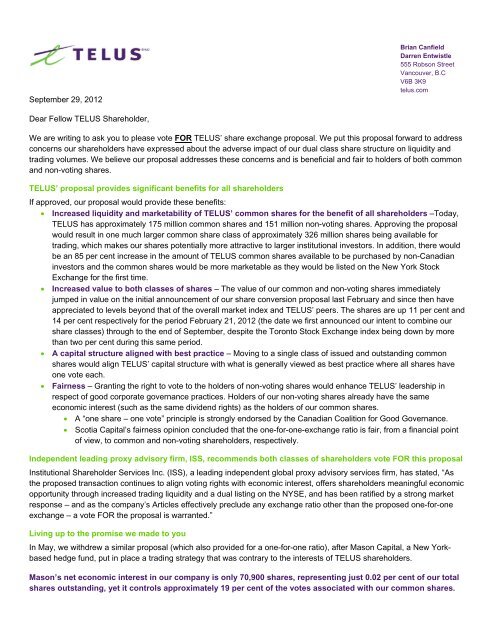
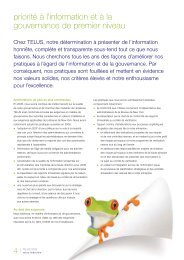
![DISK004:[98CLG6.98CLG3726]BA3726A.;28 - About TELUS](https://img.yumpu.com/16786670/1/190x245/disk00498clg698clg3726ba3726a28-about-telus.jpg?quality=85)
